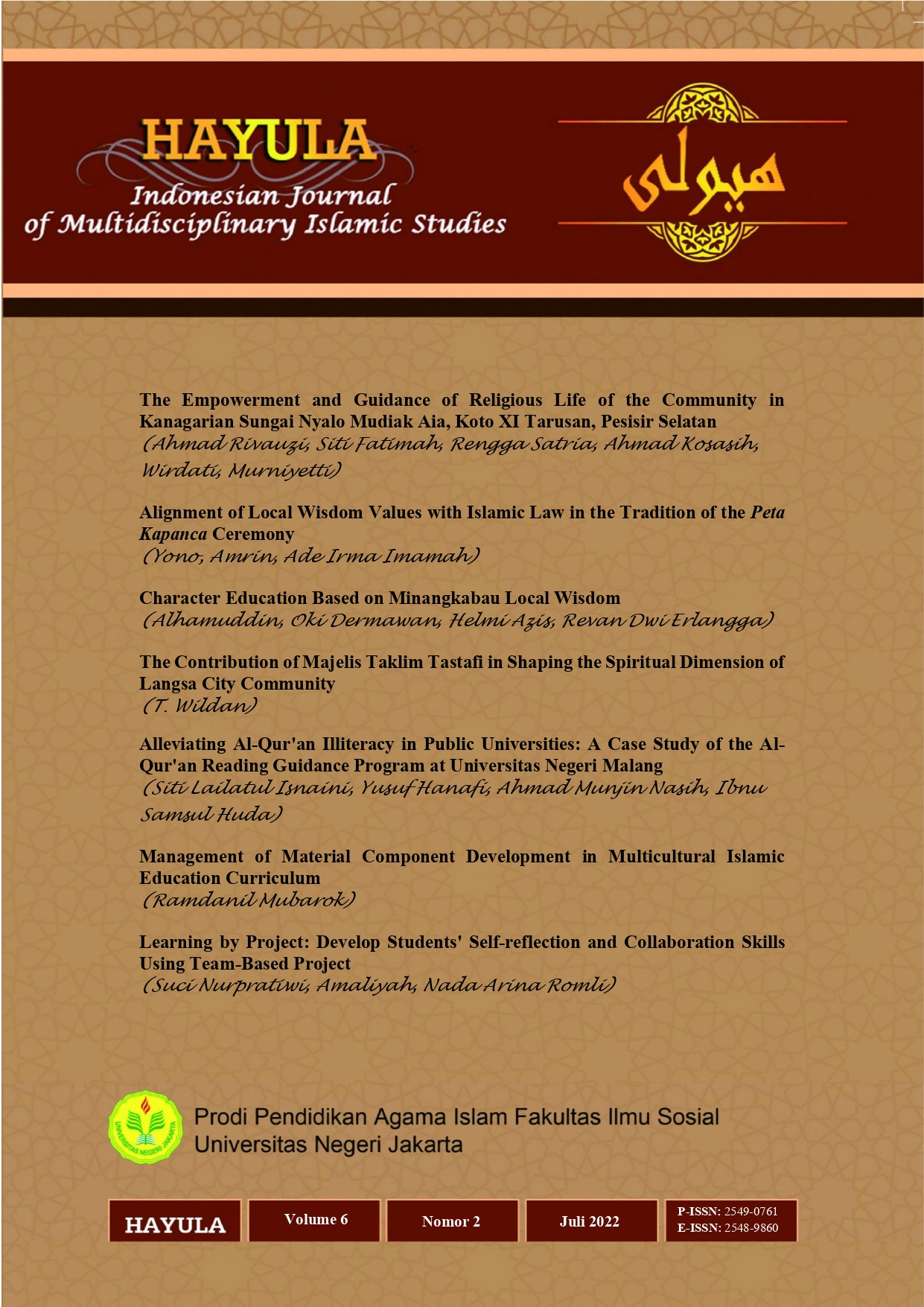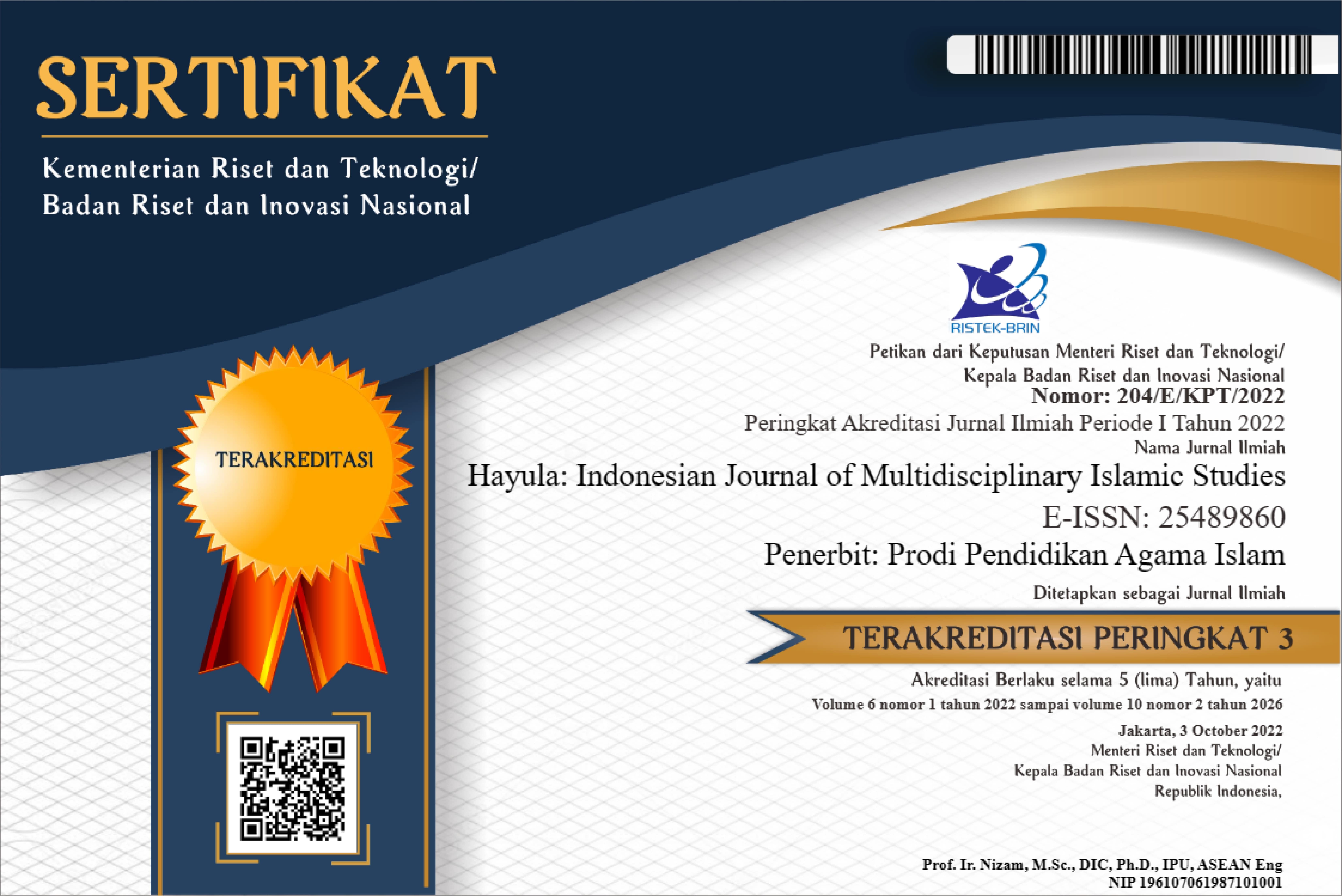Character Education Based on Minangkabau Local Wisdom
DOI:
https://doi.org/10.21009/hayula.006.02.03Keywords:
Character Education, Minangkabau Local Wisdom, Islamic Education.Abstract
Character education is the most important thing in the personality of each individual. It is not only influenced by parents and education level, but character education can be influenced by the community environment, including local wisdom in an area. The purpose of this study was to determine the transformation of Islamic education in Minangkabau in relation to Islam and local culture. The research method used was a qualitative approach with ethnographic method, ethnography was used to see how the relationship between Islam and local culture in transforming the concept of Modern Islamic education in Minangkabau. The results showed that Minangkabau local traditional expressions provide guidance and advice so that they always have religious character, honesty, tolerance, responsibility and discipline, fairness, social care, courtesy, friendly and communicative, and high work ethic. Thus it can be stated that all the values of character education that arise from the messages of advice in Minangkabau traditional expressions are in accordance with the Shari'ah and are exemplified by the Prophet Muhammad Saw
References
Alhamuddin, A., & Hamdani, F. F. R. S. (2018). Hidden Curriculum: Polarisasi Pesantren dalam Upaya Membentuk Kesalehan Individu Dan Sosial. AL-MURABBI: Jurnal Studi Kependidikan dan Keislaman, 5(1), 50-65.
Alhamuddin, A., Tsaury, A. M., Surbiyantoro, E., & Murniati, A. (2020, March). Competence of Islamic higher education graduates from the perspectives of stakeholders in the era of industrial revolution 4.0. In 2nd social and humaniora research symposium (SoRes 2019) (pp. 117-120). Atlantis Press.
David, J. (1991). Reading Ethnography. Albany: State Univ.
Daya, B. (1990). Gerakan pembaharuan pemikiran Islam. Tiara Wacana.
Dery, T. (2002). Keadilan Dalam Islam. XVIII, 337–352.
Fadhil, A. (2007). Transformasi Pendidikan Islam Di Minangkabau. Jurnal Sejarah Lontar, 4(2), 42–56.
Fitri, S. R. A., & Tantowie, T. A. (2014). Kedisiplinan, Nilai-Nilai Pendidikan 1-3, Dalam Al-Qur’an Surat Al-‘Ashr Ayat Al-Maraghi, Menurut Tafsir. Encyclopedia of Health Communication, 1–22. https://doi.org/10.4135/9781483346427.n97
HARAHAP, A. C. P. (2017). Character building. Character Building, 9(1), 1–204. https://doi.org/10.4324/9781315081526
Jamrah, S. A. (2014). Ikhtilaf Dan Etika Perbedaan Dalam Islam. Toleransi, 6(2), 223–240.
Kirom, C. (2018). Etos Kerja dalam Islam. 1(1), 57–72.
Mardhiah, I., Amaliyah, A., Hadiyanto, A., Hakam, A., & Mintarja, E. (2022). Revitalizing Generosity Through Philanthropy Values and Outcome-Based Education Islamic Religious Education Learning During the Covid-19 Pandemic.Lestariningsih, D. (2017). Pendidikan Karakter Nilai Disiplin Dan Tanggung Jawab Dalam Mata Pelajaran
Penjasorkespada Kelas Iv Di Sd N Suryodiningratan 1. Prodi PGSD Universitas PGRI Yogyakarta, 1–10. http://repository.upy.ac.id/id/eprint/1579
Musayyidi, M., & Rudi, A. (2020). Pendidikan Karakter Dalam Perspektif Islam. Jurnal Kariman, 8(02), 261–278. https://doi.org/10.52185/kariman.v8i02.152
Nasihatun, S. (2019). Pendidikan Karakter dalam Perspektif Islam dan Strategi Implementasinya. Andragogi: Jurnal Diklat Teknis Pendidikan Dan Keagamaan, 7(2), 321–336. https://doi.org/10.36052/andragogi.v7i2.100
Naufal, M. B. (n.d.). Kepedulian Sosial Dalam Perspektif Hadist. 23, 1–13.
Rasyid, R. E. (2017). Pendidikan karakter melalui kearifan lokal. Seminar Nasional Kedua Pendidikan Berkemajuan Dan Menggembirakan, 279–286.
Saifullah. (2010). Etos Kerja Dalam Perspektif Islam. Jurnal Sosial Humaniorah, 3(1), 54–69.
Samsirin, S. (2017). Nilai-Nilai Pendidikan Karakter Menurut Konsep Yusuf Qardhawi. Educan : Jurnal Pendidikan Islam, 1(1). https://doi.org/10.21111/educan.v1i1.1301
Sari, D. B. (2017). Modernisasi Pendidikan Islam Di Mesir Tiy Kusmarrabbi Karo. II(2), 97–120.
Suhendri, H. (2017). Seminar Nasional Pendidikan PGRI 2017 Pengembangan Instrumen Pengukuran Tenggang Rasa Peserta. 566–571.
Supriatin, A., & Nasution, A. R. (2017). Implementasi Pendidikan Multikultural Dalam Praktik Pendidikan Di Indonesia. Elementary: Jurnal Ilmiah Pendidikan Dasar, 3(1), 1. https://doi.org/10.32332/elementary.v3i1.785
Thontowi, A. (2000). Hakekat Religiusitas. Kemenag SumSel, 1–4.
Utami, A. T. (2014). Pelaksanaan Nilai Religius Dalam Pendidikan Karakter Di SDN 1 Kutowinangun Kebumen. Tetrahedron Letters, 55, 3909. https://www.cambridge.org/core/product/identifier/S0007125000277040/type/journal_article
Zulkhairi, T. (2017). Membumikan Karakter Jujur Dalam Pendidikan Di Aceh. Jurnal Ilmiah Islam Futura, 11(1), 104. https://doi.org/10.22373/jiif.v11i1.65
Downloads
Published
How to Cite
Issue
Section
License
Authors who publish with this Journal agree to the following terms:
- Author retain copyright and grant the journal right of first publication with the work simultaneously licensed under a creative commons attribution licensethat allow others to share the work within an acknowledgement of the work’s authorship and initial publication of this journal.
- Authors are able to enter into separate, additional contractual arrangementfor the non-exclusive distribution of the journal’s published version of the work (e.g. acknowledgement of its initial publication in this journal).
- Authors are permitted and encouraged to post their work online(e.g. in institutional repositories or on their websites) prior to and during the submission process, as it can lead to productive exchanges, as well as earlier and greater citation of published works.
Users/public use of this website will be licensed to CC BY







